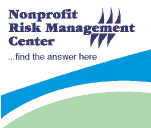|
April 9, 2008
Where Do We Get Started?
 Feel as if you’re stuck in time? Sometimes not knowing where to start can prevent an organization from moving forward. That’s why the Nonprofit Risk Management Center is bringing its “show on the road” to a regional conference location near you! These compact and information-filled regional conferences get to the heart of what you need to know NOW to prepare your organization for the future. The Center can bring workshops to your location, or you can plan to join us at one of our upcoming Regional Conferences. A cornerstone of all the Center’s conference agendas is a workshop on: Key Risk Management Policies: What Are They and How Do We Get Started? Using real-life situations that have derailed other nonprofits, this workshop will identify critical policies that every nonprofit needs to have in their arsenal of risk management strategies. Workshop participants will also gain valuable insight to techniques for working with board members and staff to integrate risk management policies into the nonprofit’s everyday operations. Feel as if you’re stuck in time? Sometimes not knowing where to start can prevent an organization from moving forward. That’s why the Nonprofit Risk Management Center is bringing its “show on the road” to a regional conference location near you! These compact and information-filled regional conferences get to the heart of what you need to know NOW to prepare your organization for the future. The Center can bring workshops to your location, or you can plan to join us at one of our upcoming Regional Conferences. A cornerstone of all the Center’s conference agendas is a workshop on: Key Risk Management Policies: What Are They and How Do We Get Started? Using real-life situations that have derailed other nonprofits, this workshop will identify critical policies that every nonprofit needs to have in their arsenal of risk management strategies. Workshop participants will also gain valuable insight to techniques for working with board members and staff to integrate risk management policies into the nonprofit’s everyday operations.
We’ve planned these special workshops at various regional conference locations:
- Managing Risk in a Changing World: This workshop addresses the increased importance of risk management in a world that looks increasingly different than what we have grown to expect and offers a framework so that all staff can become effective risk managers. (Phoenix, Tuscan)
- Good Governance, Financial Health and Your Mission: Perfect Harmony or Perfect Storm? Your board members may be dedicated to mission, excellent ambassadors and donors of substantial time and money, but are they engaged in basic financial oversight? Aware of best practices in governance? This session will illuminate the risks facing organizations in today's environment and how and why paying careful attention to good governance practice is good risk management (Dallas, Little Rock, Springdale, Billings and Kennebunkport)
- Employment Risks and Your Nonprofit: Hot Topics and Emerging Issues for 2008: After highlighting new and perennially problematic human resource challenges, this session will delve into new laws and emerging employment law risks and offer practical coping strategies suitable for nonprofit employers of any size. (Dallas, Little Rock, Springdale, Billings and Kennebunkport.)
- The New 990: Friend or Foe? What You Need to Know to Prepare Your Organization and the Board for the Road Ahead: This workshop will give your organization’s staff and board members a head start in preparing for the significant reporting changes required by the new IRS Form 990, and provide background on policy and procedural changes helpful in ensuring compliance with the new requirements. As a bonus you’ll also learn how to turn your organization’s annual financial reporting process into a significant risk management tool. (Little Rock, Springdale, Billings and Kennebunkport)
- My Risk Management Plan and other Valuable Online Tools: We’ll show you how to use various online tools to create a risk management plan for your organization and strengthen your human resource, risk management, insurance management and governance practices. (Dallas)
- 10 Steps for Surviving Litigation: During the workshop, you will learn what to expect at each stage of the process, the roles insurers, lawyers and other parties to the lawsuit play. The workshop will explain why sometimes it is necessary to pay a settlement rather than take the case to court—even when the organization doesn’t feel that it should be held responsible for the incident. (Phoenix, Tucson)
- They Did What? This workshop will provide a framework for after-the-fact analysis and implementation of changes through policies, procedures, education and risk financing tools using actual cases. (Phoenix, Tucson)
PLUS these financially-focused workshops will be featured in Kennebunkport (a two-day conference):
- Insurance Myths and Mysteries
- Fraud and Your Nonprofit: Avoiding Your Worst Nightmare
- Nonprofit Financial Basics
- Advanced Financial Management
Register today at a location near you, or contact the Center to schedule a workshop on these or another topic, customized for your organization.
Your Questions Answered by the Center’s Staff
If you have a question, just go to our web site, click on the ADVICE tab and select “Technical Assistance.” A simple form allows you to submit your question to our staff experts. We’ll respond within 48 hours and you can look for your question in a future eNews!
Our recent eNews article about the difference between volunteers and employees prompted several questions.
Q. How are “part-time” employees defined and what benefits do we have to pay them?
A. Essentially the definition of “part-time” is up to the employer. Most organizations define “full time” in terms of hours regularly worked each week and then define part time work as anything LESS than that. There is no legal requirement to provide part time employees with any particular benefits. The employer should define the benefits that part time, as opposed to full time employees, are eligible for and should spell out those benefits or limitations on eligibility clearly in employee handbooks. The only requirement to watch out for is that if the nonprofit offers a pension plan covered by ERISA, all employees who work over 20 hours per week must be entitled to participate in the plan.
For more information on employee benefits, plan to join us for the Center’s Webinar sponsored by PERI scheduled for August 6, 2008 on the topic of: Benefits in the Nonprofit Workplace: Balancing Risk and Reward.
Q: We are a membership organization for early child care and education professionals. Our organization would like to offer area college students studying early care and education a one-year student membership ($35.00 value) in exchange for a 4 hours of volunteering (one time) specifically related to our annual conference. Would this be considered compensation and therefore turn the college students into employees?
A. We do not believe the arrangement you describe changes the college students into employees. The students are being given a complimentary membership which serves to introduce them to your professional association, as an incentive for volunteering on a one-time basis. This is different from providing ongoing compensation for services rendered. The free membership could also be seen as a marketing promotion — and eligibility for the promotion is the provision of limited volunteer time for the organization.
|



 Feel as if you’re stuck in time? Sometimes not knowing where to start can prevent an organization from moving forward. That’s why the Nonprofit Risk Management Center is bringing its “show on the road” to a regional conference location near you! These compact and information-filled regional conferences get to the heart of what you need to know NOW to prepare your organization for the future. The Center can bring workshops to your location, or you can plan to join us at one of our upcoming
Feel as if you’re stuck in time? Sometimes not knowing where to start can prevent an organization from moving forward. That’s why the Nonprofit Risk Management Center is bringing its “show on the road” to a regional conference location near you! These compact and information-filled regional conferences get to the heart of what you need to know NOW to prepare your organization for the future. The Center can bring workshops to your location, or you can plan to join us at one of our upcoming